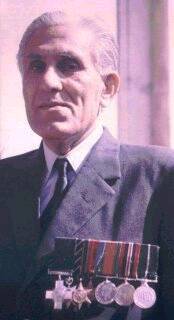Durrani, Mahmood Khan
- Date of birth:
- July 1st, 1914 (Multan City, Western Punjab , India)
- Date of death:
- August 20th, 1995 (Pakistan)
- Nationality:
- British-Indian
Biography
Do you have more information about this person? Inform us!
- Period:
- Second World War (1939-1945)
- Rank:
- Captain
- Unit:
- 1st Bahawalpur Infantry, Indian State Forces
- Awarded on:
- May 11th, 1946
With a small party he was cut off during the withdrawal in Malaya. They succeeded in remaining free in hiding for three months until betrayal, when they were arrested and confined. Refusing to join the I.N.A this officer devoted himself to rendering valuable service. He then conceived and put into execution, a plan for thwarting the Japanese plans for infiltrating agents into India. After many delays and set backs due to falling under suspicion he ultimately achieved much of his objective. Presumably as a result of the suspicion that he had been responsible for the failure of their plans, he was arrested by the Japanese. For ten days he was subjected to third degree methods including starvation, deprivation of sleep and physical torture such as the application of burning cigarettes to his legs. Subsequently he was given a mock trial and condemned to death but the execution was postponed in order that information should be extracted. He was then tortured by various particularly brutal methods continuously for several days. The exact time is uncertain as there were periods of unconsciousness, but it was certainly lasted for some days. No information whatever was obtained from him. Thereafter he was kept in solitary confinement for several months, with occasional interrogations and was given little medical treatment and just enough food to sustain life.
When finally liberated he was found to be permanently affected in health and still bears the marks of physical torture. He will never be the same again. Throughout he was fully aware of the possible consequences of his actions and, when discovered, he preferred to undergo protracted and cruel torture rather than confess his plans and save himself, because he still hoped that he might achieve his purpose. To confess would have endangered others' lives and might have influenced the enemy to change their plans.
His outstanding example of deliberate cold-blooded bravery is most fully deserving of the highest award."
- Period:
- Second World War (1939-1945)
Sources
- Photo: George Cross Database
- - GC Presentation booklet, 11 March 1947.




